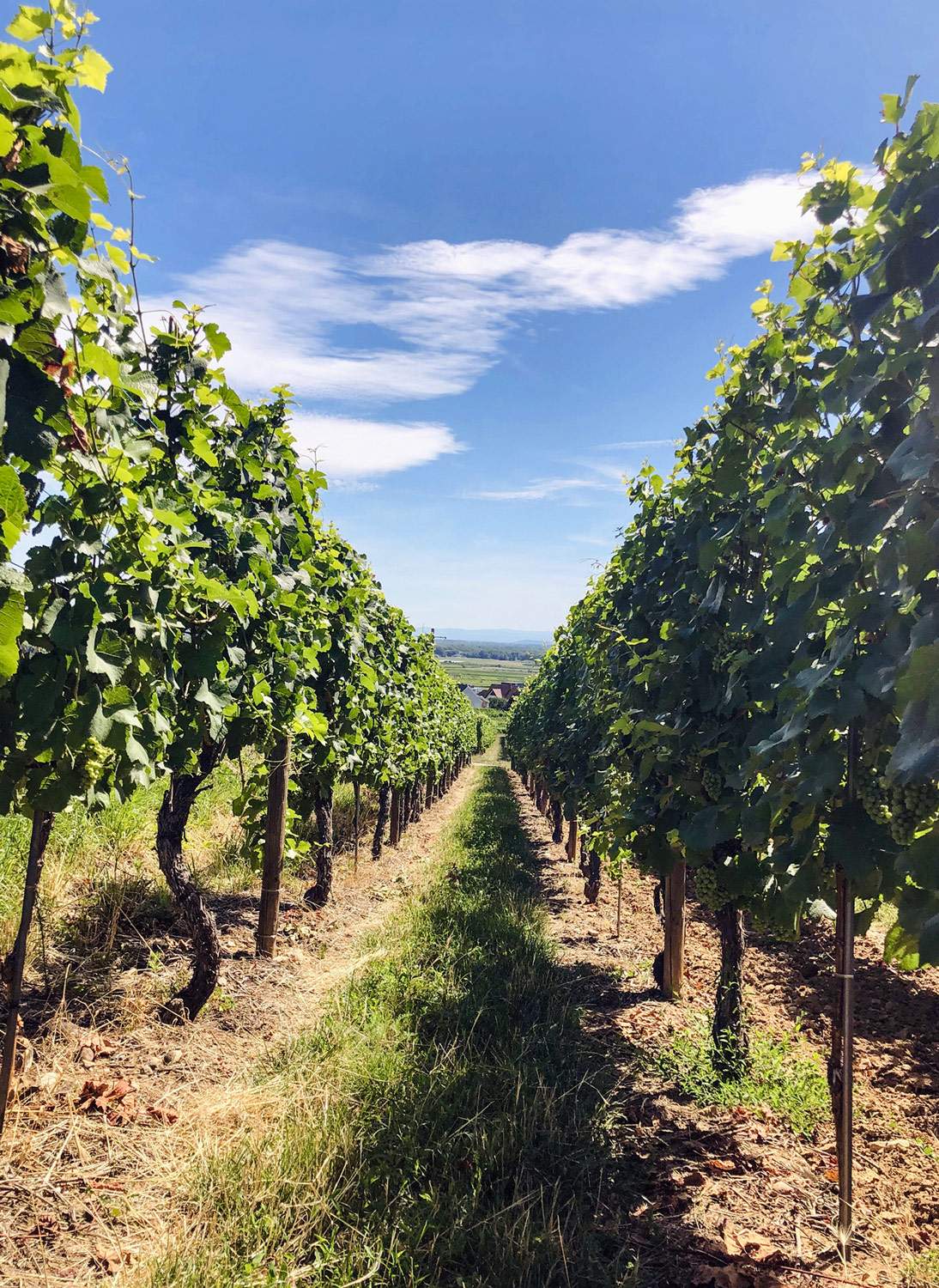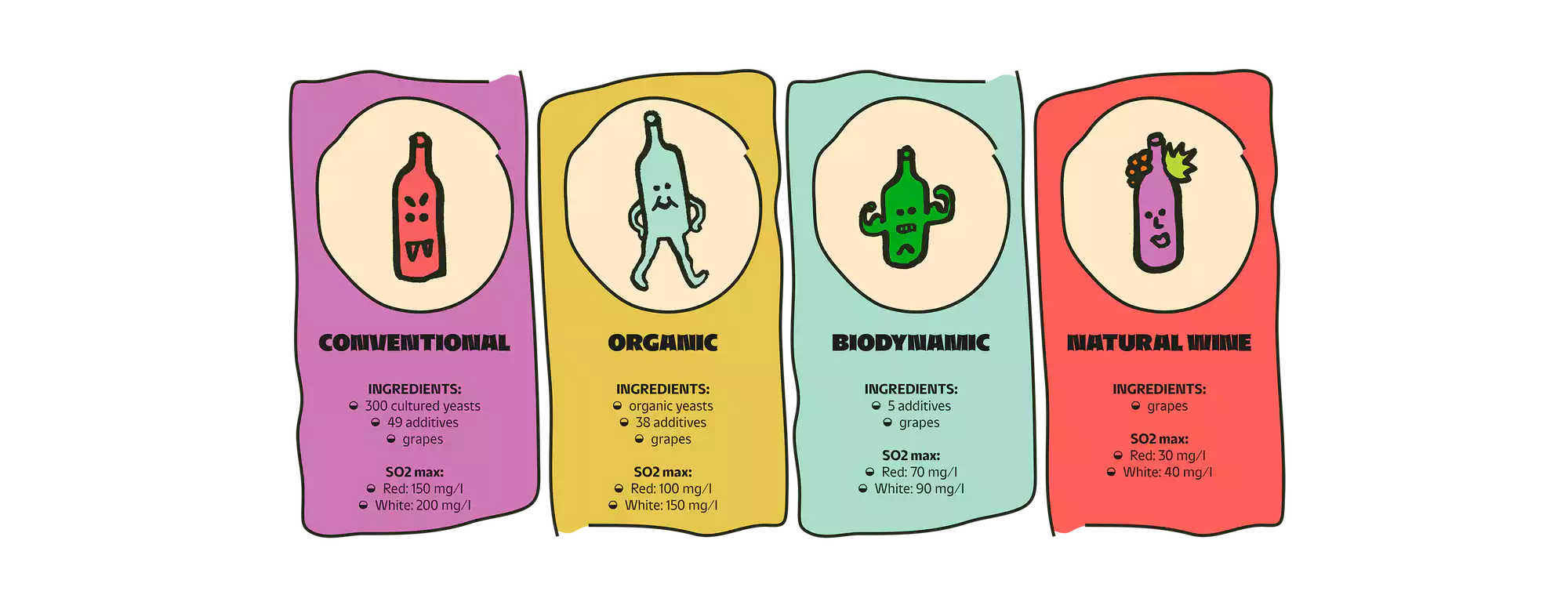“Wines are honest and exquisite
only when they are crafted by hand:
they are valuable precisely because they are not luxurious.”
- Mario Soldati -

What is Natural Wine?
Maybe you are new to this and curious or maybe you’re a skeptical “old-school drinker”. Natural wine is nothing more than the traditional way of winemaking that is currently having a comeback. On this page, we'll explain what natural wine is, how it is made, and why it's better for the environment and your body as well.
Natural wine goes by many names: from “raw” to “biodynamic” wine, to “organic”, “naked” or “low intervention” wine. For a wine to be considered natural, it must meet certain criteria:
-
1. Organic or biodynamic farming of the grapes
Organic or biodynamic farming is not always equivalent to natural winemaking. Wine from certified organic grapes can still contain (many) additives added during wine production. Due to the heavy costs of the organic certification, some producers will refuse this process. For natural winemakers, organic or biodynamic farming is the essential first step. Not all organic wine is natural, but all natural wines use organic or biodynamic grapes.
-
2. Low intervention or low impact farming
Which means minimal interference with nature. Grapes are manually harvested instead of machine-harvested, and sheep or goats are used for natural fertilization and as "lawnmowers". Green fertilizer, a mixture of plants, herbs, and peas, is also used between vines to promote soil health and create habitats for insects and animals. A healthy microbiology in the vineyard leads to successful fermentation in the cellar, resulting in a unique wine.
-
3. Little to no manipulation
in the winemaking process, as well as spontaneous fermentation, without addition of cultured yeasts, but made possible by the indigenous bacterias living on each grape. In general and unlike with most conventional winemakers, no chemicals or animal additives are used. This makes them suitable for vegans even. There will also be no or very minimal filtration, which gives many natural wines a cloudy look.
-
4. Little to no (added) sulphites
Sulphites are a natural product of fermentation, and these are harmless. Most natural winemakers will add zero to very little sulphites to preserve and stabilize their wines, while conventional wines have up to 10 times those quantities, thus the bad headaches or allergic reactions.


In short:
- No synthetic fertilizers
- No chemicals and additives
- Natural fermentation with indigenous yeasts
- Manual work in the harvesting process
- Little to no manipulation in the vinification process
- No artificial filtration and fining
- Low to no sulphites
- Adoration and respect of the grape, the soil and the natural cycles
- Sustainability
- Living wines from living soils
You need to keep in mind that wine is a living being,
and, like me and you, it is in constant change.

What Does It Taste Like?
Despite lingering skepticism and associations with amateurish practices and strange aromas, natural wine has evolved significantly. Terms like "cabbagy," "eccentric" or "weird" are no longer representative of the majority. Nowadays, most natural wines are exceptionally well-crafted and can easily be mistaken for the classic tastes preferred by traditional wine enthusiasts.
First of all, natural wine is a product that showcases the meticulous work of man. The idea of "leaving the grapes alone" implies letting them rot, resulting in undrinkable wine. Natural winemakers are masters of the right timing, precision and natural cycles. A lot of handiwork is put into transforming grapes into wine, yielding incredible flavors without any unwanted eccentricities - just the right kind of uniqueness.
Natural wine offers a remarkable array of flavors. From exceptionally elegant to complex and to easily drinkable, the variety can be surprising.
The drinkabilty and pleasantness of our wines is our main focus. We don't follow "funky" trends. Give natural wine a chance, and you'll discover that it embodies the true essence of what wine was always meant to be.

Why Choose Natural Wine?
Natural wine is a sustainable, ethical, and flavorful choice that's better for you and the environment. By choosing natural wine, you're supporting organic and biodynamic farming practices, promoting biodiversity and soil health, and enjoying a unique and delicious product that mirrors the terroir, the craftsmanship of the winemaker and the unique conditions of each vintage.
